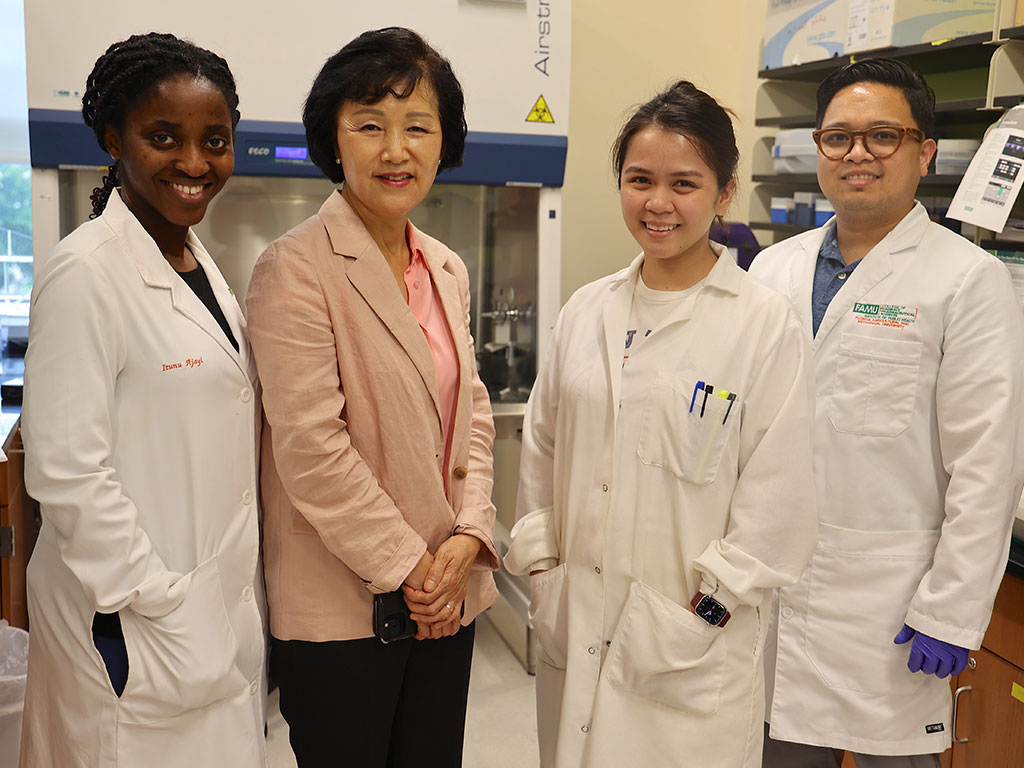FAMU CoPPS, IPH Professor Eun-sook Yu Lee Receives Third R01 Grant to Study Parkinson’s Disease

Tallahassee, Fla. – In honor of World Brain Day, the Florida A&M University (FAMU) College of Pharmacy and Pharmaceutical Sciences, Institute of Public Health (CoPPS, IPH) is pleased to recognize Distinguished Professor Eun-sook Yu Lee, Ph.D., who recently received her third R01 grant in the amount of $3,386,262 from the Department of Health and Human Services (DHHS), National Institutes of Health (NIH), the National Institute of Environmental Health Sciences (NIEHS). This five-year grant, commencing June 6, 2025 through March 31, 2030, titled “Mechanism of Manganese (Mn)-induced neurotoxicity via microglial Leucine Rich Repeat Kinase 2 (LRRK2),” will study the contributing factors in Parkinson’s disease.
“Dr. Eun-sook Lee’s most recent R01 award is a landmark achievement for the College and for the University, and is a tangible testament to her unwavering commitment to advancing neuroscience and public health,” said FAMU CoPPS, IPH Interim Dean Seth Y. Ablordeppey, Ph.D. “Her work exemplifies the scientific rigor, innovation, and mentorship that define our mission at the FAMU CoPPS, IPH. As we continue to pursue research excellence, this R01 grant reinforces our institution’s leadership in addressing neurological health disparities through groundbreaking discoveries.”

According to the Parkinson’s Foundation, Parkinson’s disease (PD) is a neurodegenerative disorder that affects predominantly the dopamine-producing neurons in a specific area of the brain called the substantia nigra. People with PD may experience tremors, slowness, paucity of movement, limb stiffness, and balance problems. This project will research how manganese causes toxicity in the brain, resulting in Parkinson’s disease-like symptoms called manganism.
“We will use cell cultures and a genetic mouse model which deletes the LRRK2 gene in the specific cell type in the brain called microglia, to determine the role of LRRK2 in microglial cells associated with causing manganese toxicity,” said Lee. “This study is important to educate the people who are living in the area with high levels of manganese found in contaminated water and air pollution that this exposure may cause manganism.”
Lee explained that people can also be exposed to high levels of manganese through pesticides or while working in mines and alloy metal manufacturing.
“Mutation of LRRK2 gene is most commonly associated with genetic Parkinson’s disease cases, and is known to increase LRRK2 activity. Manganese also increases LRRK2 activity. This means that manganese-induced abnormally high LRRK2 activity may contribute to the development of Parkinson’s disease, particularly in those people who have LRRK2 mutations, increasing their risk of developing Parkinson’s disease,” said Lee.
Lee, who earned her Ph.D. in pharmacology from the FAMU CoPPS, IPH in 1999, was awarded an SC1 grant in 2010 and R01 grants in 2015 and 2020. In 2016, she returned to FAMU to expand her research scope and collaborations, bringing along an R01 grant from Meharry Medical College, where she served for 11 years as a tenured faculty. Additionally, she reviewed numerous R01 grants as a standing member of the NIH Neurotoxicology and Alcohol [NAL] Study Section (2017-2023), which further helped her to develop grantsmanship and a strong network with great scientists in the field.
"I extend my warmest congratulations to Dr. Lee on being awarded an R01 grant from the NIH—an extraordinarily prestigious and competitive honor. This is the only R01, with her another active R01 grant (in addition to this new R01 grant), currently held at FAMU, marking a most significant achievement that brings distinction to both the College and to the University. This award is a testament to Dr. Lee’s ongoing outstanding research accomplishments and a clear recognition of her pioneering work on manganese neurotoxicity," emphasized Karam F.A. Soliman, Ph.D., FASPET, Associate Dean for FAMU CoPPS, IPH Research & Graduate Studies.
Lee said she is grateful that this funding will support and sustain her postdoctoral research fellows who will conduct the experiments in the project. She also expressed thanks to her colleagues.
“I thank my lab members, particularly Dr. Edward Pajarillo, an assistant professor in research, for the consistent hard work, contributing to this grant by providing critical preliminary data, and dedication to sciences,” said Lee. “I’d also like to acknowledge the tremendous support of Dr. Carl Goodman, a former director of my division, on transitioning to FAMU and providing a great research environment, and Dr. Karam Soliman, associate dean for Research, for his endless support of my research activity at FAMU.”
Media Contact:
Alonda Thomas
alonda.thomas@famu.edu
Back to Stories

